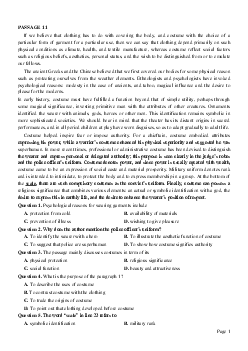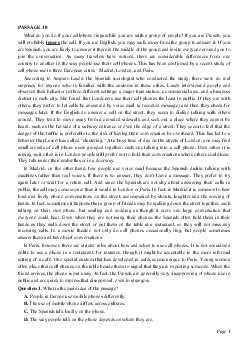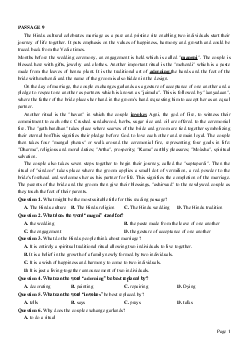



Preview text:
PASSAGE 29
Death of the classroom: The New Wave of Online Education
Picture a society where learning can happen at any time, in any place and can be completed without
ever going to class. This could be the essence of education and the internet technology now exists to
support such a system. The virtual classroom is here. If you are interested in English, or Civil
Engineering, then head to the university and click yourself a degree. Well, maybe it's not that easy, but
you would be on the right track. The flexibility of studying at your own pace and the money you save
with online courses are two of the main attractions.
The Web is a powerful educational tool. Yet some feel that virtual classrooms will isolate students
from each other, which will result in problems developing interpersonal relationships and that these skills
are much more important than computer skills. Should teachers teach kids how to behave in society, how
to respect others and how to cooperate or should kids have already learned this from their parents? No
one is saying that social skills aren't important, however, virtual classrooms are far about more than just
computer skills. Some strongly believe that education can be taught via the Web and social skills can be
gained from joining sports teams, summer camps, or just hanging out! Others argue that this virtual
classroom may place pressure on students: to become computer literate or be left behind in life. Is this
undue pressure or reality? Maybe being left behind in life is a little dramatic, but the reality is that the
computer age is here. Whether you want to pay for your new jeans with your debit card, or check to see if
the library has the book you want, you're going to need some computer skills.
The development of flexible, inquiring minds has rarely been the main concern in the design of
educational systems. After all, if you have over thirty inquiring minds and only one teacher, flexibility
could be a problem. It seems that developing students' proper social behaviour has always exceeded the
concern to develop students' creativity. Computer technology can make individualized attention a real
possibility. At the Institute for the Learning Sciences, systems are being developed to allow people to try
out things in simulated worlds. This technology will allow for the individual creative growth in students.
The Web will provide amazing opportunities for the education of our society. Anyone with a phone
line and a computer has access to unlimited amounts of knowledge and programs designed to help them
learn and understand. The teachers and parents involved with these programs will be given the job of
making sure that students lead well-balanced lives that combine Web-based education and positive social
interaction with their friends and neighbors. Imagine your recreation room has now become your
classroom and your parents seem to be doing as much homework as you are! So, be prepared as the
virtual classroom may find its way to a computer screen near you!
Question 1. What is the author's overall attitude towards a virtual classroom?
A. He is enthusiastic. B. He is skeptical. C. He is indifferent. D. He is disapproving.
Question 2. Why are people attracted to online education?
A. Because it is cheap and flexible.
B. Because it is fashionable and new.
C. Because it is powerful and easy.
D. Because it is unlimited and fast.
Question 3. What do the opponents of online education maintain?
A. The virtual classroom will result in dramatic changes.
B. The virtual classroom will place a burden on students.
C. Students' academic performance will suffer. Page 1
D. Students cannot ignore the reality of the computer age.
Question 4. The word "computer literate" in paragraph 2 is closet in meaning to ? A. computer based
B. unable to use computer C. computerized
D. able to use computer
Question 5. What do the advocates of online education maintain
A. It develops computer skills.
B. It increases student's social skills.
C. It will boost student's creativity.
D. It complements education at home.
Question 6. Why does the author mention “over thirty inquiring minds and only one teacher"?
A. To prove that inquiring minds have been the main concern of the educational system.
B. To prove that teachers overestimate the value of students' social behaviour.
C. To prove that individualized attention is hardly possible in a traditional classroom.
D. To prove that teachers feel no special concern for developing students' flexibility.
Question 7. What role are parents supposed to play in the web-based education of society?
A. They will have to do home assignments together with their kids.
B. They will have to balance social activities and learning of their kids.
C. They will have to control the virtual and real-life activities of their kids.
D. They will have to help their kids get access to the virtual classroom.
Question 8. The word "essence" in the first paragraph mostly means" ”. A. substance B. abstract C. description D. exteriority ĐÁP ÁN 1-A 2-A 3-B 4-D 5-D 6-B 7-D 8-A
LỜI GIẢI CHI TIẾT Question 1: A
Thái độ chung của tác giả đối với một lớp học ảo là gì? A. Anh ấy nhiệt tình. B. Anh ấy hoài nghi. C. Anh ấy thờ ơ.
D. Anh ấy không tán thành. Question 2: A
Tại sao mọi người bị thu hút bởi giáo dục trực tuyến?
A. Vì nó rẻ và linh hoạt.
B. Vì nó là thời trang và mới.
C. Vì nó mạnh mẽ và dễ dàng.
D. Vì nó không giới hạn và nhanh chóng.
DẪN CHỨNG: The flexibility of studying at your own pace and the money you save with online courses
are two of the main attractions.
DỊCH: Sự linh hoạt của việc học theo tốc độ của riêng bạn và số tiền bạn tiết kiệm được với các khóa học
trực tuyến là hai trong số những điểm thu hút chính. Page 2 Question 3: B
Những gì các đối thủ của giáo dục trực tuyến duy trì?
A. Lớp học ảo sẽ dẫn đến những thay đổi mạnh mẽ.
B. Lớp học ảo sẽ đặt gánh nặng lên học sinh.
C. Kết quả học tập của học sinh sẽ bị ảnh hưởng.
D. Học sinh không thể bỏ qua thực tế của thời đại máy tính.
DẪN CHỨNG: It seems that developing students' proper social behaviour has always exceeded the
concern to develop students' creativity. Computer technology can make individualized attention a real possibility.
DỊCH: Dường như việc phát triển hành vi xã hội đúng đắn của học sinh luôn vượt quá mối quan tâm để
phát triển khả năng sáng tạo của học sinh. Công nghệ máy tính có thể làm cho sự chú ý cá nhân trở thành
một khả năng thực sự. Question 4: D
Từ "computer literate " trong đoạn 2 có nghĩa gần nhất với? A. dựa trên máy tính
B. không thể sử dụng máy tính C. vi tính hóa
D. có thể sử dụng máy tính
DẪN CHỨNG: Some strongly believe that education can be taught via the Web and social skills can be
gained from joining sports teams, summer camps, or just hanging out! Others argue that this virtual
classroom may place pressure on students: to become computer literate or be left behind in life.
DỊCH: Một số người tin tưởng mạnh mẽ rằng giáo dục có thể được dạy qua Web và các kỹ năng xã hội
có thể đạt được từ việc tham gia các đội thể thao, trại hè hoặc chỉ đi chơi! Những người khác cho rằng lớp
học ảo này có thể gây áp lực cho sinh viên: trở thành người biết chữ hoặc bị bỏ lại phía sau trong cuộc sống. Question 5: D
Những người ủng hộ giáo dục trực tuyến duy trì những gì
A. Nó phát triển các kỹ năng máy tính.
B. Nó làm tăng các kỹ năng xã hội của học sinh.
C. Nó sẽ thúc đẩy sự sáng tạo của học sinh.
D. Nó bổ sung cho giáo dục ở nhà.
DẪN CHỨNG: The Web will provide amazing opportunities for the education of our society. Anyone
with a phone line and a computer has access to unlimited amounts of knowledge and programs designed
to help them learn and understand. The teachers and parents involved with these programs will be given
the job of making sure that students lead well-balanced lives that combine Web-based education and
positive social interaction with their friends and neighbors. Imagine your recreation room has now
become your classroom and your parents seem to be doing as much homework as you are!
DỊCH: Web sẽ cung cấp những cơ hội tuyệt vời cho giáo dục của xã hội chúng ta. Bất cứ ai có đường dây
điện thoại và máy tính đều có quyền truy cập vào lượng kiến thức và chương trình không giới hạn được
thiết kế để giúp họ học và hiểu. Các giáo viên và phụ huynh tham gia vào các chương trình này sẽ được
giao nhiệm vụ đảm bảo rằng học sinh có cuộc sống cân bằng kết hợp giáo dục dựa trên Web và tương tác
xã hội tích cực với bạn bè và hàng xóm. Hãy tưởng tượng phòng giải trí của bạn bây giờ đã trở thành lớp
học của bạn và bố mẹ bạn dường như đang làm nhiều bài tập về nhà như bạn. Page 3 Question 6: B
Tại sao tác giả lại đề cập đến hơn ba mươi câu hỏi và chỉ có một giáo viên "?
A. Để chứng minh rằng những bộ óc tìm hiểu đã là mối quan tâm chính của hệ thống giáo dục.
B. Để chứng minh rằng giáo viên đánh giá quá cao giá trị của hành vi xã hội của học sinh.
C. Để chứng minh rằng sự chú ý cá nhân là khó có thể có trong một lớp học truyền thống.
D. Để chứng minh rằng giáo viên cảm thấy không có mối quan tâm đặc biệt đối với việc phát triển tính linh hoạt của học sinh.
DẪN CHỨNG: It seems that developing students' proper social behaviour has always exceeded the
concern to develop students' creativity. Computer technology can make individualized attention a real
possibility. At the Institute for the Learning Sciences, systems are being developed to allow people to try
out things in simulated worlds. This technology will allow for the individual creative growth in students.
DỊCH: Dường như việc phát triển hành vi xã hội đúng đắn của học sinh luôn vượt quá mối quan tâm để
phát triển khả năng sáng tạo của học sinh. Công nghệ máy tính có thể làm cho sự chú ý cá nhân trở thành
một khả năng thực sự. Tại Viện Khoa học Học tập, các hệ thống đang được phát triển để cho phép mọi
người thử mọi thứ trong thế giới giả lập. Công nghệ này sẽ cho phép sự phát triển sáng tạo cá nhân trong sinh viên. Question 7: D
Cha mẹ có vai trò gì trong giáo dục dựa trên web của xã hội?
A. Họ sẽ phải làm bài tập về nhà cùng với con của họ.
B. Họ sẽ phải cân bằng các hoạt động xã hội và học tập của con cái họ.
C. Họ sẽ phải điều khiển các hoạt động ảo và thực tế của những đứa trẻ của họ.
D. Họ sẽ phải giúp con mình tiếp cận với lớp học ảo.
DẪN CHỨNG: The teachers and parents involved with these programs will be given the job of making
sure that students lead well-balanced lives that combine Web-based education and positive social
interaction with their friends and neighbors. Imagine your recreation room has now become your
classroom and your parents seem to be doing as much homework as you are! So, be prepared as the
virtual classroom may find its way to a computer screen near you!
DỊCH: Các giáo viên và phụ huynh tham gia vào các chương trình này sẽ được giao nhiệm vụ đảm bảo
rằng học sinh có cuộc sống cân bằng kết hợp giáo dục dựa trên Web và tương tác xã hội tích cực với bạn
bè và hàng xóm. Hãy tưởng tượng phòng giải trí của bạn bây giờ đã trở thành lớp học của bạn và bố mẹ
bạn dường như đang làm nhiều bài tập về nhà như bạn! Vì vậy, hãy chuẩn bị vì lớp học ảo có thể tìm
đường đến màn hình máy tính gần bạn! Question 8: A
Từ "essence" trong đoạn đầu tiên chủ yếu có nghĩa là " . A. chất B. trừu tượng C. mô tả D. ngoại thất
DẪN CHỨNG: Picture a society where learning can happen at any time, in any place and can be
completed without ever going to class. This could be the essence of education and the internet technology
now exists to support such a system.
DỊCH: Hình dung một xã hội nơi việc học có thể xảy ra bất cứ lúc nào, bất cứ nơi nào và có thể được
hoàn thành mà không bao giờ đến lớp. Đây có thể là bản chất của giáo dục và công nghệ internet hiện tồn
tại để hỗ trợ một hệ thống như vậy. Page 4




